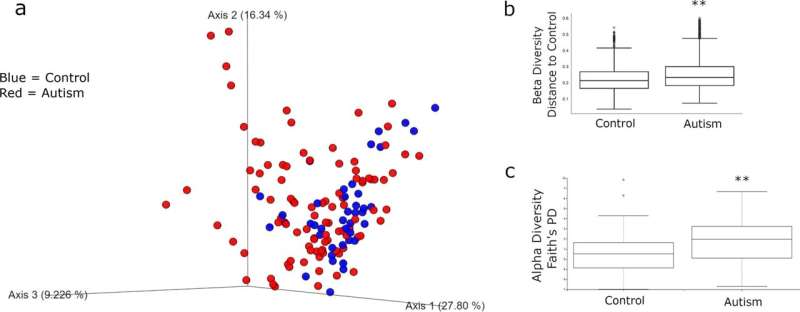This article has been reviewed according to Science X's editorial process and policies. Editors have highlighted the following attributes while ensuring the content's credibility:
fact-checked
peer-reviewed publication
trusted source
proofread
Study reveals microbiome changes linked to autism spectrum disorder

Autism spectrum disorder (ASD), a neurodevelopmental condition characterized by decreased social communication and repetitive behaviors, has long intrigued scientists seeking to unravel its underlying mechanisms. Researchers from the Azrieli Faculty of Medicine of Bar-Ilan University have now identified a potential link between ASD and the composition of the gut microbiome.
The researchers analyzed the diversity of the gut microbiome in an Israeli cohort of 96 individuals diagnosed with ASD and 42 neurotypical individuals. Their findings, recently published in the journal npj Biofilms and Microbiomes, point to significant differences in both alpha and beta diversity in individuals with ASD and identify specific types of bacteria that are found in higher abundance in individuals with autism.
The key discoveries include an unexpected increase in alpha diversity, a measure of microbial diversity, and a notable rise in the relative abundance of the phylum Bacteriodetes and the genus Bacteroides in individuals with ASD. Traditionally, decreased alpha diversity has been associated with compromised health in various conditions.
However, the increased alpha diversity observed in the ASD cohort challenges prevailing notions, especially considering its potential connection to neurological diseases. Bacteroides, normally found in the human gut microbiome, may have a disadvantageous impact on health when increased in abundance.
To investigate the potential functional consequences of these microbiome changes, the researchers conducted experiments involving newborn mice. Mice treated with Bacteroides fragilis at birth exhibited social behavior dysfunction, increased repetitive behaviors, and gene expression dysregulation.
"Our research suggests that an overabundance of Bacteriodes, particularly in early life, may have functional consequences for individuals with ASD. This sheds new light on the complex interplay between the microbiome and neurodevelopment in individuals with ASD," said the study's lead researcher, Prof. Evan Elliott, of Bar-Ilan University's Azrieli Faculty of Medicine. The study was conducted in collaboration with Prof. Omry Koren, a microbiome expert at the Azrieli Faculty.
Intriguingly, these effects were observed primarily in male mice, with female mice showing no behavioral deficits, suggesting that males may be more susceptible to environmental factors contributing to ASD. The research underscores the importance of further investigation into the sex-specific aspects of ASD and the potential role of microbial composition.
The implications of this research extend beyond the laboratory, offering potential avenues for further exploration into the long-term effects of microbial interventions during early developmental stages and their implications for brain development.
More information: Julie Carmel et al, Bacteroides is increased in an autism cohort and induces autism-relevant behavioral changes in mice in a sex-dependent manner, npj Biofilms and Microbiomes (2023). DOI: 10.1038/s41522-023-00469-2




















